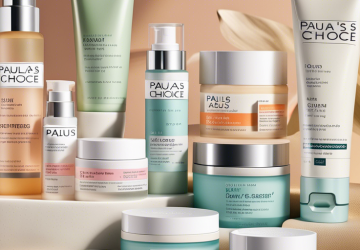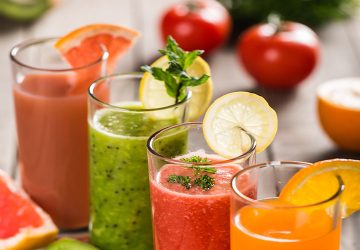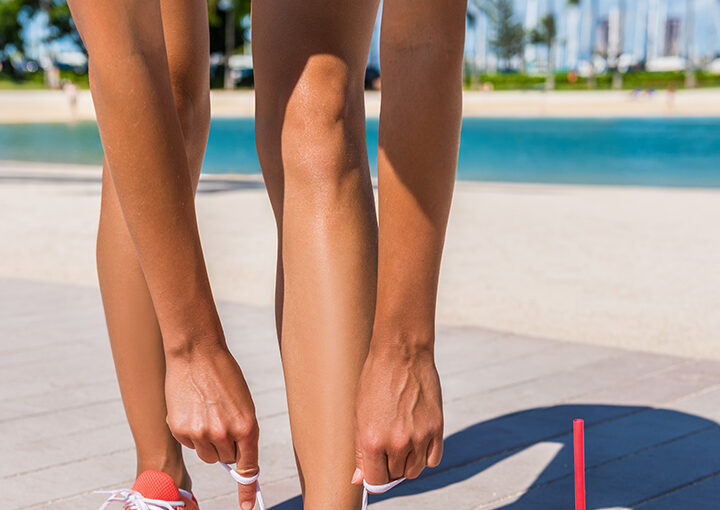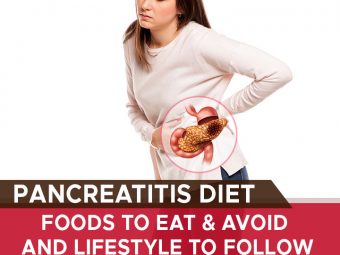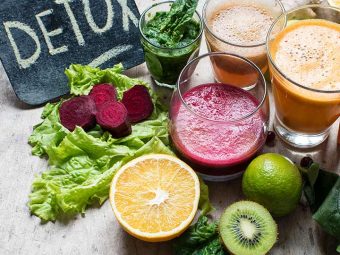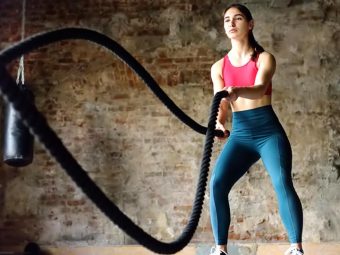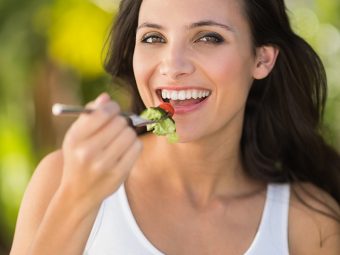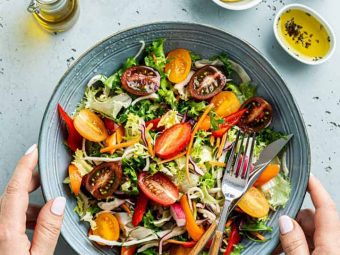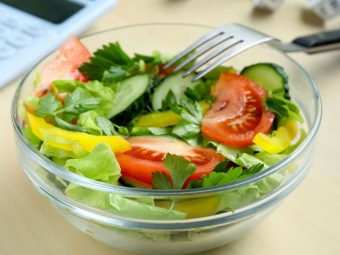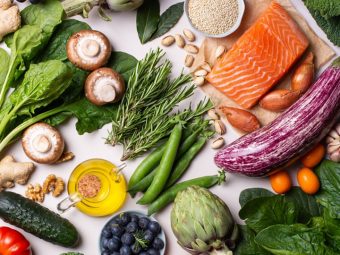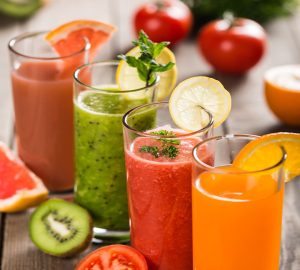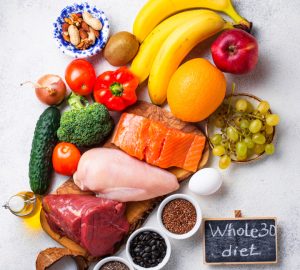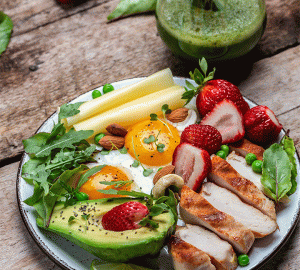[ad_1]
Unlock your full running potential and say goodbye to injuries with the runner’s diet. Give yourself a competitive edge over others with a well-rounded diet that offers the ideal ratio of carbohydrates, protein, healthy fats, and vital vitamins and minerals. Your meals before and after your run can make all the difference in your performance and recovery. Whether you are a beginner or a seasoned pro, this guide will show you how to boost your metabolism for peak performance and unleash your true running potential. The secret to achieving your best on the track or trail may just be lying on your plate. Keep reading to learn more.
What Is The Runner’s Diet?
The runner’s diet focuses on a balanced diet of carbohydrates, proteins, healthy fats, and essential minerals and vitamins. Proper nutrition provides the required energy to fuel runs and recuperate from training. The runner’s diet can also enhance endurance, avoid injury, and promote muscle growth and repair (1).
One may get on different types of runners’ diets depending on their specific needs and goals. Some of these include:
1. High-Carbohydrate Diet
Consuming lots of carbohydrates to power runs and refuel afterward. Beneficial for endurance runners or those who participate in long-distance running events.
2. Low-Carbohydrate Diet
Consuming fewer carbohydrates while consuming more healthy fats and proteins. Beneficial for those looking to lose weight and improve body composition.
3. Low-Fat Diet
A lower fat and higher intake of carbohydrates and protein. Beneficial for anyone trying to get healthier and lose weight.
4. High-Fat Diet
A high intake of healthy fats that is beneficial for runners looking to reduce inflammation and improve their overall health.
5. Vegetarian/Vegan Diet
Eliminates meat and other animal products for plant-based protein sources, carbs, and lipids.
6. Gluten-Free Diet
Cuts out wheat, barley, rye, and products containing gluten.
Did You Know?
The first ever recorded marathon race was held in 490 BC in Greece where a messenger ran from Marathon to Athens to deliver news of a military victory.
Dietary requirements for runners may differ depending on their body composition, training regimen, level of intensity, and personal food preferences. However, the science behind it remains the same. Scroll down for additional information on this diet and how it works.
How Does The Runner’s Diet Work?
A runner’s diet should be a healthy balance of carbohydrates, protein, healthy fats, vitamins and minerals, and would comprise fruits, vegetables, and whole grains. Drinking enough water and electrolyte-rich fluids is essential for runners to stay hydrated.
Carbohydrates
The majority of a runner’s diet should consist of carbohydrates because they are the main energy source for running.
Studies indicate that carbohydrate ‘loading’ may improve marathon performance by enabling the runner to maintain their preferred pace for more time before becoming fatigued. This can be achieved by reducing exercise days before the marathon and consuming 10-12 g/kg of carbohydrates daily in the 48-hour period before the event (2).
Excellent sources of carbohydrates include whole grains, fruits, vegetables, and legumes. These foods give runners the energy to finish their training and aid in replenishing muscle glycogen stores (3).
Did You Know?
The human body can run up to 25 miles per hour. However, the average running speed for most people is around 8 miles per hour.
Protein
Protein is pivotal for runners because it supports the recovery and regrowth of muscle tissue damaged during exercise (4). Studies suggest that endurance athletes’ recommended daily protein intake may be between 1.2 and 2.0 g/kg (5).
Marathon runners who had a carbohydrate and protein mix during a run experienced less weariness and muscle pain 72 hours later than those who only consumed carbohydrates. This indicates that proteins play a role in post-run muscle recovery (6).
Lean meats, fish, eggs, dairy products, beans, lentils, and quinoa are excellent protein sources for runners.
Healthy Fats
Runners should have a reasonable amount of healthy fats in addition to carbohydrates, protein, and other macronutrients. Fat intake of about 30% of daily calories is advised for athletes. However, those looking to shed body fat may consume 0.51g/kg/day of dietary fat (7).
Studies suggest that runners who follow a low-fat diet take in fewer calories and perform less efficiently on endurance tests than those who follow a medium- or high-fat diet (8). Thus, consumption of good fats is imperative for marathon runners.
These include the monounsaturated and polyunsaturated fats in foods like olive oil, nuts, seeds, and avocado (9).
Vitamins And Minerals
Vitamins and minerals like iron and calcium are essential for runners as they deliver oxygen to cells and boost bone health, respectively (10), (11).
However, chronic vitamin and/or mineral supplementation does not improve exercise performance (12). Obtain your daily requirements from your diet alone rather than concentrating solely on multivitamins or mineral supplements. Whole grains, nuts, seeds, fruits, and vegetables are excellent sources of vitamins and minerals.
Hydration
Drinking enough water is critical to helping you perform better, recover more quickly, and avoid injuries (13). Runners should try to drink lots of water and electrolyte-rich beverages throughout the day, but should focus on doing so before, during, and after exercise.
If your objective is to lose extra weight while running, you can achieve it by subtly altering your diet. Scroll down to learn more about it.
Runner’s Diet For Weight Loss
A runner’s diet can work for weight loss by creating a calorie deficit, which occurs when the body burns more calories than it consumes. Running and other forms of exercise can increase energy expenditure while lowering overall calorie intake (14).
Running enthusiasts should consume nutrient-dense foods while reducing processed foods and added sugars to aid in weight loss (15), (16). By doing so, they are consuming the right nutrients to sustain their running while also consuming fewer calories overall.
Runners should also be mindful of the timing and portion size of their carb intake to avoid overeating. Running more frequently and intensely can help burn more calories and establish a calorie deficit to aid in weight loss. However, this should be done gradually and under the guidance of a coach or physician to avoid injury.
StyleCraze Says
Change up your daily running routine by combining interval training, running on different surfaces, and experimenting with other sports like cycling or swimming.
Aside from better weight management, this diet also offers other health advantages. Learn them in the next section.
Benefits Of The Runner’s Diet
1. May Help Reduce Inflammation
Adequate intake of healthy fats found in nuts, seeds, and olive oil can help reduce inflammation in the body (9). Inflammation can lead to injury and delay recovery, so reducing it can help runners recover faster and perform better (17), (18).
Animal studies suggest that extra virgin olive oil can improve physical activity-inducedoxidative stressi XA condition caused by an imbalance between the creation and buildup of oxygen radicals in muscles and the ability to detoxify them. and inflammation (19). In a study, healthy adults who took omega-3 supplements after eccentric arm curl exercise experienced reduced inflammation (20).
2. May Boost Overall Health
Consuming a variety of fruits, vegetables, whole grains, lean proteins, and healthy fats can support overall health and reduce the risk of chronic diseases. Studies have linked healthy eating habits to a moderately lower incidence of type 2 diabetesi XA long-term condition where your body produces or uses insulin inefficiently, leading to high blood sugar levels. , fractures, and colorectal and breast cancers. A weak correlation between a healthy diet and cardiovascular mortality and respiratory disorders was also discovered (21).
3. May Boost Mental Health
Adequate nutrition can improve mood and cognitive function, which can help runners perform and feel better overall.
Studies suggest that diets rich in omega-3 fatty acids and low in saturated fats lower the risk of stress-related psychiatric issues (22). Both the Mediterranean diet and the runner’s diet encourage the consumption of fruits, nuts, vegetables, and fish. A study found that the Mediterranean diet is healthier for mental health than the Western diet, which is often characterized by “unhealthy” eating habits (23). Thus, maintaining a healthy, specialized diet for runners may improve their mental health.
All of these advantages come from nutrient-dense foods that are part of this diet. Find out which meals you can indulge in and should stay away from in the following section.
Runner’s Diet Food List
A runner’s diet should consist of nutrient-rich foods that provide the body with the required energy to support training and performance. The following foods are suggested:
| Carbohydrates | Protein | Healthy Fats | Hydration |
|---|---|---|---|
| Whole grains (brown rice, quinoa, oats, barley, and whole wheat bread) | Lean meats (chicken, turkey, fish, and tofu) | Nuts and seeds (almonds, chia seeds, and flax seeds) | Water |
| Legumes (beans, lentils, and chickpeas) | Avocados | Electrolyte-rich beverages (coconut water, sports drinks, and herbal teas) | |
| Olive oil |
Along with these major macronutrient groups, the following foods need to be consumed:
- Fruits: Berries, apples, oranges, watermelon, kiwi, apricot, peaches, and plums
- Vegetables: Leafy greens, broccoli, bell peppers, cauliflower, carrots, cucumbers, tomatoes, squash, and sweet potatoes
- Dairy: Low-fat milk, yogurt, cheese, and other dairy products
Limit or avoid meals rich in saturated and trans fats, added sugars, and processed foods when following a diet plan for runners. The specific foods to limit or stay away from are:
- Fried Foods: High in saturated and trans fats, which can increase inflammation and contribute to weight gain (24).
- Processed Meats: Sausages, bacon, and deli meats are high in sodium and saturated fats and have been linked to an increased risk of colorectal, colon, and rectal cancers (25), (26).
- Sweets And Sugary Drinks: High in added sugars, which contribute to weight gain and an increased risk of type 2 diabetes, coronary heart disease (CHD)i XA type of heart disease characterized by damaged blood vessels due to plaque buildup, resulting in reduced blood supply to the heart. , and stroke (27).
- High-calorie, High-fat Snacks: Snacks like potato chips, cookies, and candy are high in calories and fat and can contribute to weight gain (28).
- High-salt Foods: Increase blood pressure and the risk of heart disease (29).
- Alcohol: Heavy alcohol consumption can dehydrate the body, disrupt your sleep, and impact your overall performance (30).
StyleCraze Says
Electrolyte-rich drinks are supposed to complement water rather than replace it. These replenish the electrolytes lost through sweating.
The time and quantity of your meals significantly impact how well you run. Check out in the next section what you need to eat at the various run stages.
Before You Run
It’s essential to provide proper nutrition needed for the run and to stay away from fatty or heavy foods that may upset your stomach. Here are some recommendations for pre-run meals and snacks:
- 2-4 Hours Before A Run: Eat a balanced meal that contains carbohydrates, protein, and healthy fats.
- 1-2 Hours Before A Run: Eat a simple, light snack like a banana, granola bar, or a small yogurt dish if you are feeling hungry.
- 30 Minutes To 1 Hour Before A Run: Consume a small amount of easily digestible carbohydrates like a sports drink, an energy gel, or a piece of fruit.
During A Run
Refilling your body’s energy reserves is essential throughout a run to retain performance and avoid weariness. You might need to consume carbs and electrolytes while running, depending on the length and difficulty of the run. Following are some options for fuelling up while running:
- Sports Drinks: Formulated to provide carbohydrates and electrolytes to help maintain hydration and blood sugar levels during prolonged exercise.
- Energy Gels: Concentrated sources of carbohydrates like glucose, maltodextrin, or fructose. They are easy to carry and consume during a run and provide a quick energy boost.
- Energy Chews: Similar to energy gels but in a chewable form, they usually contain a mix of carbohydrates and electrolytes.
- Fruit or Candy: Natural foods like bananas, dried fruits, or sports candies that are high in carbohydrates and easy to consume on a run.
After A Run
Eating the right foods after a run is crucial for the recovery, repair, and replenishment of energy stores. Here are some guidelines for post-run meals and snacks:
- Within 30 Minutes After A Run: Eat a snack or meal containing a mix of carbohydrates and protein. You can have recovery bars, protein shakes, or healthy smoothies.
- Within 2 Hours After A Run: Have a balanced meal that contains carbohydrates, protein, and healthy fats. Opt for recipes that include Greek yogurt with oatmeal, granola, or fruits like berries. You can also incorporate lean meats like tuna, chicken, or salmon.
The amount of fluids you need to consume before, during, and after a run depends on your body weight, length and difficulty of the run, temperature and humidity, and your requirements. The following guidelines are recommended by the National Athletic Trainers’ Association (NATA) (13):
- Before a run: Drink about 500 to 600 ml of water or a sports drink 2-3 hours before your run and an additional 200 to 300 ml of fluids 10-20 minutes before your run.
- During a run: Fluid replacement during the workout should match sweat and urine losses. Retain hydration level that limits body weight loss to under 2%, which is accomplished by consuming 200 to 300 ml of fluids every 10-20 minutes.
- After a run: Hydration after exercise should compensate for any fluid lost during training or competition. You can weigh yourself before and after the run to know how much water you need to drink.
StyleCraze Says
Even if you don’t feel thirsty, drink water frequently because thirst is not always a reliable indicator of hydration. If it’s hot and humid outside, drink about 100 – 200 ml of water every 15 minutes to stay hydrated.
If you are unclear about where to begin or what to cook, fret not. The following sample meal plan can help you get started.
Sample Runner’s Diet Meal Plan
Here is a sample 7-day runner’s meal plan that you can follow:
Day 1
| Meal | What To Eat |
|---|---|
| Breakfast | Oatmeal with sliced banana and a sprinkle of chia seeds |
| Lunch | Whole wheat pasta with turkey meatballs, marinara sauce, and a side of steamed broccoli |
| Snacks | Apple slices with peanut butter |
| Dinner | Grilled chicken breast with quinoa and roasted vegetables |
Day 2
| Meal | What To Eat |
|---|---|
| Breakfast | Whole wheat toast with avocado and a poached egg |
| Lunch | Turkey and cheese wrap with a side of mixed greens salad |
| Snacks | Greek yogurt and berries |
| Dinner | Baked salmon with sweet potatoes and green beans |
Day 3
| Meal | What To Eat |
|---|---|
| Breakfast | Scrambled eggs with whole wheat toast and spinach |
| Lunch | Whole wheat pita stuffed with falafel, tzatziki, and a side of mixed greens |
| Snacks | Banana and almond butter |
| Dinner | Slow-cooked lentil soup with a side of whole wheat bread |
Day 4
| Meal | What To Eat |
|---|---|
| Breakfast | Whole wheat waffles with fresh berries and yogurt |
| Lunch | Grilled chicken breast with a side of quinoa and steamed vegetables |
| Snacks | A small serving of mixed nuts |
| Dinner | Vegetable and bean burrito with a side of salsa and avocado |
Day 5
| Meal | What To Eat |
|---|---|
| Breakfast | Oatmeal with banana slices, walnuts, and a sprinkle of cinnamon |
| Lunch | Whole wheat pasta with tomato sauce and ground turkey |
| Snacks | Cottage cheese and pineapple |
| Dinner | Grilled chicken breast with roasted sweet potatoes and steamed broccoli |
Day 6
| Meal | What To Eat |
|---|---|
| Breakfast | Scrambled eggs with whole wheat toast and avocado |
| Lunch | Quinoa salad with mixed greens, cherry tomatoes, cucumber, and feta cheese |
| Snacks | Rice cakes with peanut butter and honey |
| Dinner | Baked salmon with brown rice and sautéed spinach |
Day 7
| Meal | What To Eat |
|---|---|
| Breakfast | Whole wheat pancakes with fresh berries and a dollop of Greek yogurt |
| Lunch | Turkey sandwich with whole wheat bread, lettuce, tomato, and avocado |
| Snacks | Hard-boiled egg and an orange |
| Dinner | Grilled vegetables (bell peppers, zucchini, onion) with quinoa and black beans |
Remember that this is only a sample meal plan. You should speak with a sports nutritionist for personalized advice. However, certain people shouldn’t adhere to a runner’s diet without the guidance of a doctor or a qualified dietician. Learn more about this in the next section.
Who Should Not Follow The Runner’s Diet Plan
Certain runners should ensure that their diet is safe and provides all the necessary nutrients to support running. The diet should support recovery and not interfere with the medications they take. These include individuals who:
- Have food allergies or sensitivities
- Have a particular medical condition like diabetes (31)
- Have eating disorders (32)
- Pregnant or breastfeeding women (33)
- Individuals on medications like warfarin and antibiotics (34)
Every runner has distinct needs and goals and should customize their diet to meet them. The general public should also be informed of the possible drawbacks of adhering to a runner’s diet.
Side Effects Of The Runner’s Diet
You may experience the following side effects while on a runner’s diet:
Anecdotal evidence suggests that runners consuming low-calorie foods or not getting enough carbohydrates may experience rapid weight loss. This may result in exhaustion, injury, and poor performance. However, further research is warranted in this regard.
A very restrictive diet or eliminating entire food groups can lead to nutritional deficiencies. This may lead to unhealthy eating habits and a poor relationship with food (35).
- Gastrointestinal Distress
Consuming excess high-fiber foods might result in bloating, gas, and diarrhea (36).
Little or excessive consumption of diuretici XAny ingredient, substance, or drug that encourages diuresis (excessive urine production) to flush out salt and water. fluids (coffee, tea, alcohol) can lead to dehydration, which can negatively impact performance and recovery (37).
Remember that eating a healthy, varied diet may prevent these adverse effects. Advice from a nutritionist or an experienced dietitian can ensure that a runner’s diet is well-balanced, supports their training, and prevents these possible side effects.
The Final Word
Diet and lifestyle are essential to a runner’s training and results. It’s crucial to consume a balanced diet and plenty of water to power your runs. However, a runner’s diet should be customized to meet their unique demands and goals. Remember, no two people are the same when it comes to weight loss. So, it is imperative to speak with a registered dietitian or a doctor to develop a personalized plan that addresses your needs and health objectives.
Frequently Asked Questions
How much should a runner eat a day?
Generally, a runner should have 12–15 calories/pound of body weight/day.
Anecdotal evidence suggests that a runner weighing 150 pounds has to eat 1800–2250 calories daily. Speak with a sports nutritionist to address your unique requirements and objectives.
What foods make you run faster?
Carb-rich foods may make you run faster, as they are the primary energy source. While simple carbohydrates like those in sports drinks and gels are beneficial during a race to give you a short energy boost, complex carbs provide sustained energy (3).
Key Pointers
- A runner’s diet should have carbs for energy, protein for muscle repair, healthy fats for recovery, and hydration for performance.
- Focus on wholesome, nutritious foods like whole grains, lean proteins, healthy fats, fruits, and vegetables.
- Individuals with allergies and diabetes should avoid the runner’s diet as it may interfere with the medications they take.
Sources
Articles on StyleCraze are backed by verified information from peer-reviewed and academic research papers, reputed organizations, research institutions, and medical associations to ensure accuracy and relevance. Read our editorial policy to learn more.
- Nutrition and Muscle Recovery
https://www.ncbi.nlm.nih.gov/pmc/articles/PMC7909540/ - Nutrition strategies for the marathon : fuel for training and racing
https://pubmed.ncbi.nlm.nih.gov/17465604/ - High-Quality Carbohydrates and Physical Performance
https://www.ncbi.nlm.nih.gov/pmc/articles/PMC5794245/ - Effects of Protein Supplementation on Performance and Recovery in Resistance and Endurance Training
https://www.ncbi.nlm.nih.gov/pmc/articles/PMC6142015/ - Protein Supplementation Throughout 10 Weeks of Progressive Run Training Is Not Beneficial for Time Trial Improvement
https://www.ncbi.nlm.nih.gov/pmc/articles/PMC6230989/ - Protein Supplementation During or Following a Marathon Run Influences Post-Exercise Recovery
https://www.ncbi.nlm.nih.gov/pmc/articles/PMC5872751/ - Current knowledge about sports nutrition
https://www.ncbi.nlm.nih.gov/pmc/articles/PMC3562955/ - The effects of varying dietary fat on performance and metabolism in trained male and female runners
https://pubmed.ncbi.nlm.nih.gov/10682876/ - Dietary Fat and Sports Nutrition: A Primer
https://www.ncbi.nlm.nih.gov/pmc/articles/PMC3905293/ - Recent Advances in Iron Metabolism: Relevance for Health, Exercise, and Performance
https://pubmed.ncbi.nlm.nih.gov/25494391/ - Calcium, physical activity and bone health–building bones for a stronger future
https://pubmed.ncbi.nlm.nih.gov/11255501/ - International Society of Sports Nutrition Position Stand: nutritional considerations for single-stage ultra-marathon training and racing
https://www.ncbi.nlm.nih.gov/pmc/articles/PMC6839090/ - Hydration to Maximize Performance and Recovery: Knowledge, Attitudes, and Behaviors Among Collegiate Track and Field Throwers
https://www.ncbi.nlm.nih.gov/pmc/articles/PMC8336541/ - Rate of weight loss can be predicted by patient characteristics and intervention strategies
https://www.ncbi.nlm.nih.gov/pmc/articles/PMC3447534/ - Optimal Diet Strategies for Weight Loss and Weight Loss Maintenance
https://www.ncbi.nlm.nih.gov/pmc/articles/PMC8017325/ - Ultra-processed diets cause excess calorie intake and weight gain: An inpatient randomized controlled trial of ad libitum food intake
https://www.ncbi.nlm.nih.gov/pmc/articles/PMC7946062/ - Inflammatory Arthropathy in the Elite Sports Athlete
https://pubmed.ncbi.nlm.nih.gov/34752430/ - Soft Tissue Injections in the Athlete
https://www.ncbi.nlm.nih.gov/pmc/articles/PMC3445176/ - Effects of dietary extra-virgin olive oil on oxidative stress resulting from exhaustive exercise in rat skeletal muscle: a morphological study
https://pubmed.ncbi.nlm.nih.gov/23810034/ - The Effect of Omega-3 Fatty Acid Supplementation on the Inflammatory Response to eccentric strength exercise
https://www.ncbi.nlm.nih.gov/pmc/articles/PMC3737804/ - Healthy and unhealthy dietary patterns and the risk of chronic disease: an umbrella review of meta-analyses of prospective cohort studies
https://pubmed.ncbi.nlm.nih.gov/32600500/ - Diet, Stress and Mental Health
https://www.ncbi.nlm.nih.gov/pmc/articles/PMC7468813/ - Food and mood: how do diet and nutrition affect mental wellbeing?
https://www.ncbi.nlm.nih.gov/pmc/articles/PMC7322666/ - The Effect of Trans Fatty Acids on Human Health: Regulation and Consumption Patterns
https://www.ncbi.nlm.nih.gov/pmc/articles/PMC8535577/ - Mechanistic evidence for red meat and processed meat intake and cancer risk: A follow-up on the International Agency for Research on Cancer Evaluation of 2015
https://www.ncbi.nlm.nih.gov/pmc/articles/PMC6294997/ - Red and Processed Meat and Colorectal Cancer Incidence: Meta-Analysis of Prospective Studies
https://www.ncbi.nlm.nih.gov/pmc/articles/PMC3108955/ - The role of sugar-sweetened beverages in the global epidemics of obesity and chronic diseases
https://www.ncbi.nlm.nih.gov/pmc/articles/PMC8778490/ - The Hidden Dangers of Fast and Processed Food*
https://www.ncbi.nlm.nih.gov/pmc/articles/PMC6146358/ - Dietary Sodium Intake and Risk of Cardiovascular Disease: A Systematic Review and Dose-Response Meta-Analysis
https://www.ncbi.nlm.nih.gov/pmc/articles/PMC7601012/ - The Risks Associated With Alcohol Use and Alcoholism
https://www.ncbi.nlm.nih.gov/pmc/articles/PMC3307043/ - Nutritional Recommendations for Individuals with Diabetes
https://www.ncbi.nlm.nih.gov/books/NBK279012/ - Eating Disorders
https://www.ncbi.nlm.nih.gov/books/NBK567717/ - Macronutrient and Micronutrient Intake during Pregnancy: An Overview of Recent Evidence
https://www.ncbi.nlm.nih.gov/pmc/articles/PMC6413112/ - Food-Drug Interactions
https://www.ncbi.nlm.nih.gov/pmc/articles/PMC3191675/ - Micronutrient deficiency in obese subjects undergoing low calorie diet
https://www.ncbi.nlm.nih.gov/pmc/articles/PMC3404899/ - Gas and Bloating
https://www.ncbi.nlm.nih.gov/pmc/articles/PMC5350578/ - Influence of diuretic-induced dehydration on competitive running performance
https://pubmed.ncbi.nlm.nih.gov/4033401/
Related
LATEST ARTICLES
[ad_2]

